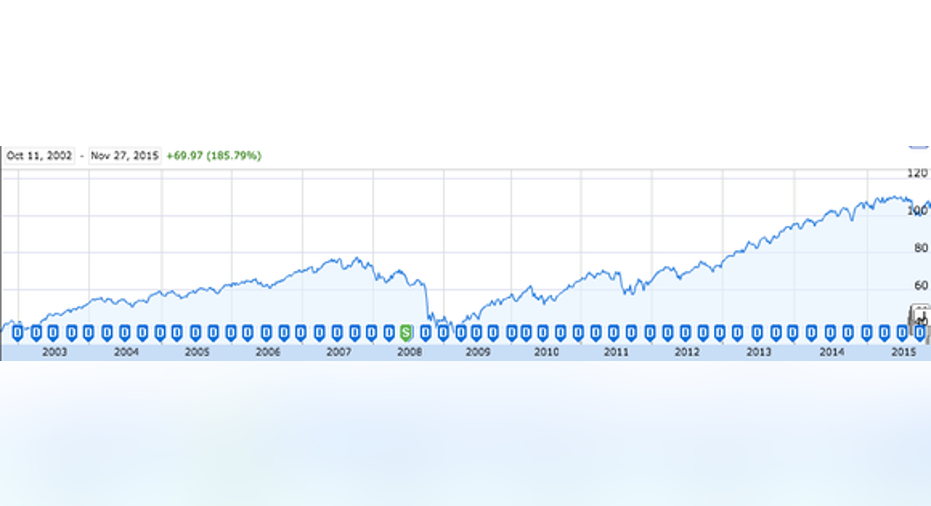The Single Biggest Tax Break You Shouldnt Forget

Find out how to cut down on those taxes below. Photo: Alan Cleaver, via Flickr.
Paying your fair share of taxes is important. They provide the money necessary to build the roads you drive on, pay for the schools you will (or did) send your kids to, and many other conveniences. At the same time, there's no need to pay more than you're required to come April 18.
In interview published years ago in Kiplinger's Personal Finance, former IRS commissioner Fred Goldberg revealed one tax "break" in particular that millions of Americans forget to take advantage of.
I put quotes around "break" because the tax savings being missed here don't actually come from a tax break at all. Rather, it's a common mistake that is easily made when people redeem their ETF or mutual fund shares -- whether in retirement, to pay the bills, or to make a big purchase. This impact of the mistake is limited to non-retirement accounts, and is all about the effect of dividend reinvestment.
A quick primer on investment taxesUsually, the only time you'll owe the IRS money on your investments (not including your Roth IRA) is when you cash them out. You could own shares of Company A for 10 years -- during which their value increases 10-fold -- and never pay a dime in taxes for the gains that you see on paper. You only get a tax bill on the profits when you sell your shares.
But for a large number of investors, there's another ongoing investment situation that needs to be considered: dividends. Most of the time, working Americans make the smart choice to have the dividends paid out by their mutual funds, ETFs, or individual stocks automatically reinvested in the securities that paid them. Even though that money is immediately spent, you will owe taxes on those dividends in the year they were paid -- with the amount varying depending on your overall income.
There's nothing wrong with paying those taxes. In fact, it's illegal to avoid them.
Where the big mistake is madeThe scenario below isn't necessarily realistic, as it involves a one-off transaction. But we'll use it to demonstrate the principle behind this tax rule.
Let's say that you bought $10,000 worth of shares of Vanguard's Total Stock Market ETF back in October 2002, and you've been reinvesting the dividends ever since. On Dec. 1, 2015, that investment was worth $40,340.
VTI Total Return Price data by YCharts
You decided to cash out the entire stake on Dec. 1. Here's what you might expect your tax situation would look like from this investment.
|
Cost Basis |
Cash Out Amount |
Capital Gains |
Tax Rate |
Total Taxes Owed |
|---|---|---|---|---|
|
$10,000 |
$40,340 |
$30,340 |
15% |
$4,551 |
Here's the thing: As intuitive as those numbers may seem, if you use them, you'll be overpaying by a wide margin. Why? Because every time you received a dividend and reinvested it, you paid taxes on your dividends. With each reinvestment, you should also be increasing your cost basis. Failing to do so will cause your dividends to be taxed twice!
How big of a deal is this? It depends. But for our example investment in Vanguard's Total Market ETF, take a look at the fund's chart from 2002 to 2015, as shown on Google Finance.
Source: Google Finance
Each one of those blue Ds represents a dividend payment that -- if not accounted for -- will be taxed twice. After doing a little math, I found that the cost basis for this investment would have increased all the way to $12,735 because of dividend reinvestments. That means the real tax situation looks like this.
|
Cost Basis |
Cash Out Amount |
Capital Gains |
Tax Rate |
Total Taxes Owed |
|---|---|---|---|---|
|
$12,735 |
$40,340 |
$27,605 |
15% |
$4,141 |
Thus, in this scenario, the taxpayer who failed to account for dividend reinvestment would be overpaying by $410 -- about 10%. But as I said before, this isn't a very realistic example. In real life, folks might be cashing out investments that paid bigger dividends, or that were purchased multiple times. Those factors could make the double taxation effect really add up.
First the good news, then the bad news, then the good newsFortunately for those who started investing after 2012, the IRS now requires all firms to keep track of the cost basis for their customers -- including dividend reinvestment. So this won't really be a huge problem a few decades from now.
Unfortunately, that doesn't help people who were invested in securities before 2012 -- a group that likely includes the vast majority of investors reading this article and nearing retirement. However, if you break out the elbow grease and contact your brokerage firm, you should be able to get the information you need to make sure you aren't overpaying on your capital gains taxes.
Make the effort: You might be surprised at what a big difference it makes.
The article The Single Biggest Tax Break You Shouldnt Forget originally appeared on Fool.com.
Suzanne Frey, an executive at Alphabet, is a member of The Motley Fool's board of directors. Brian Stoffel owns shares of Alphabet (A shares) and Alphabet (C shares). The Motley Fool owns shares of and recommends Alphabet (A shares) and Alphabet (C shares). Try any of our Foolish newsletter services free for 30 days. We Fools may not all hold the same opinions, but we all believe that considering a diverse range of insights makes us better investors. The Motley Fool has a disclosure policy.
Copyright 1995 - 2016 The Motley Fool, LLC. All rights reserved. The Motley Fool has a disclosure policy.



















